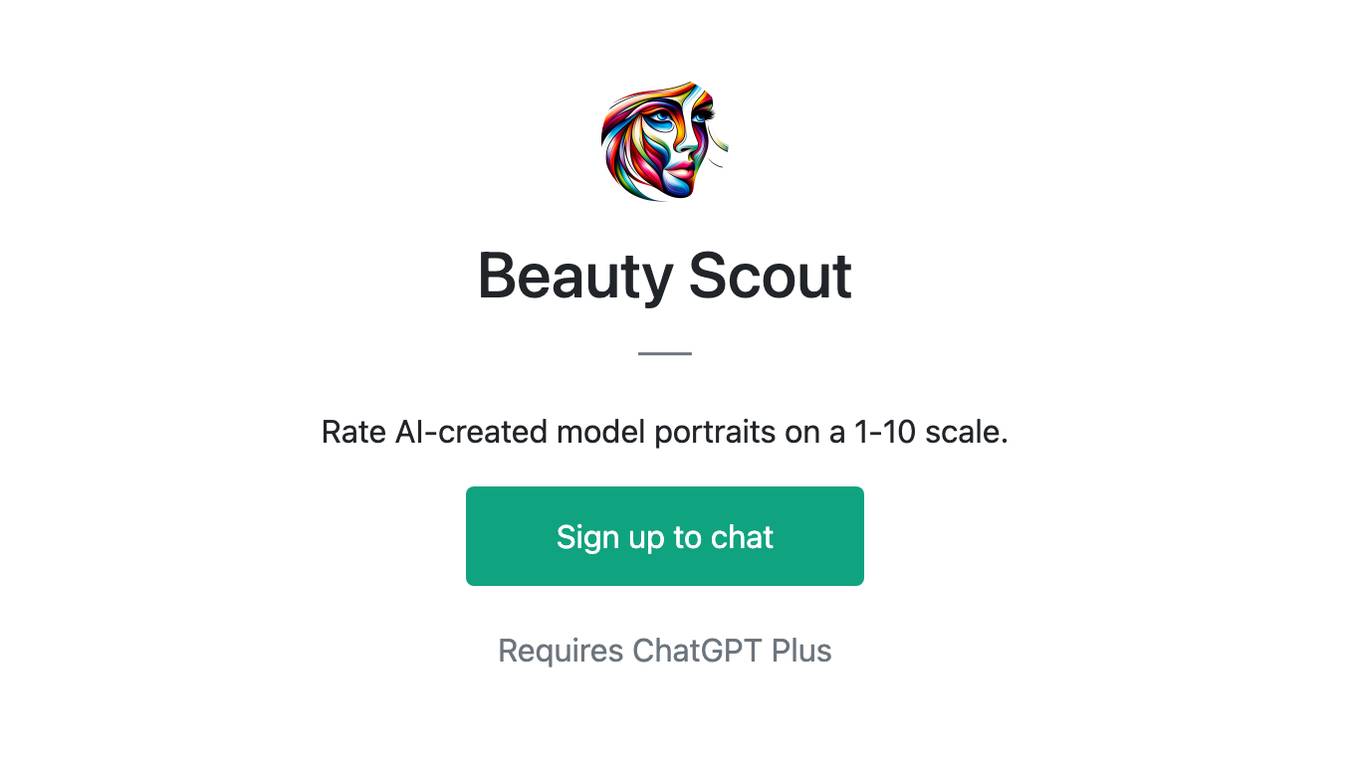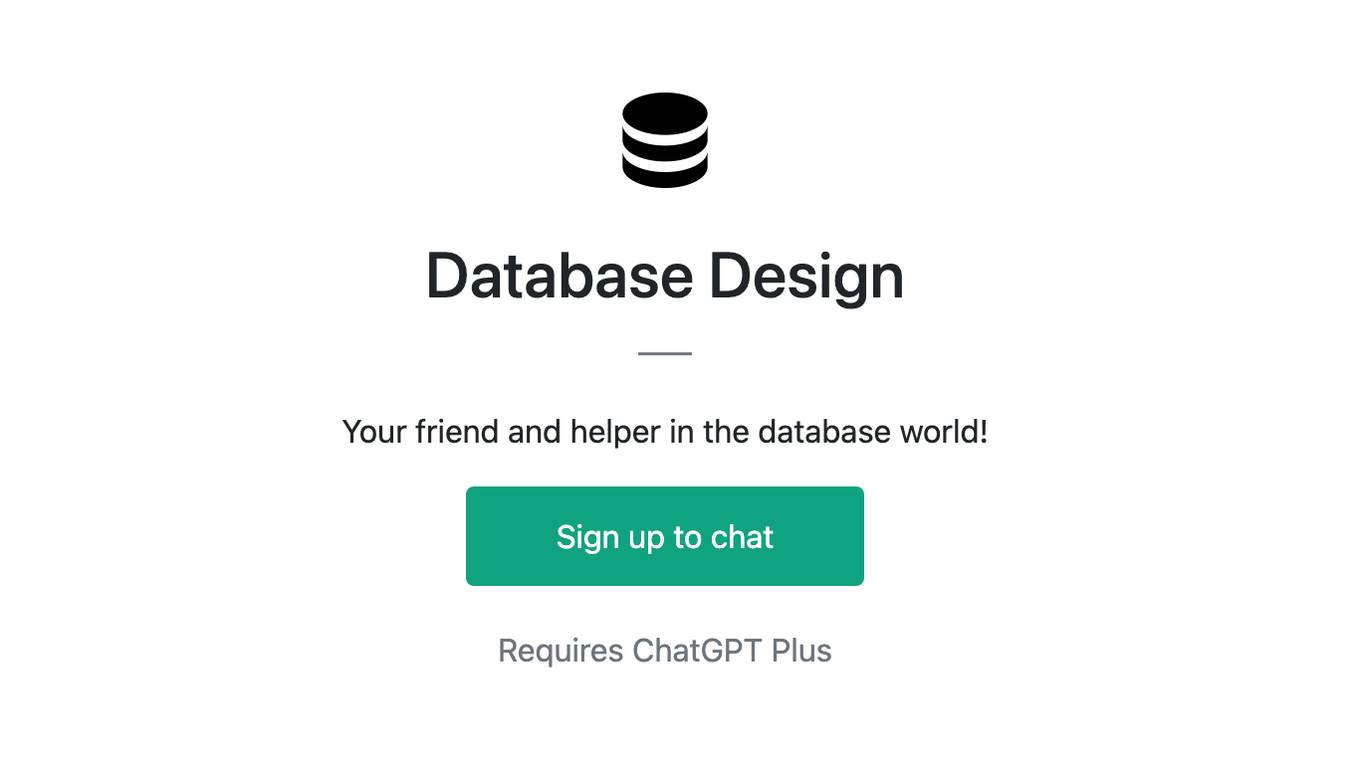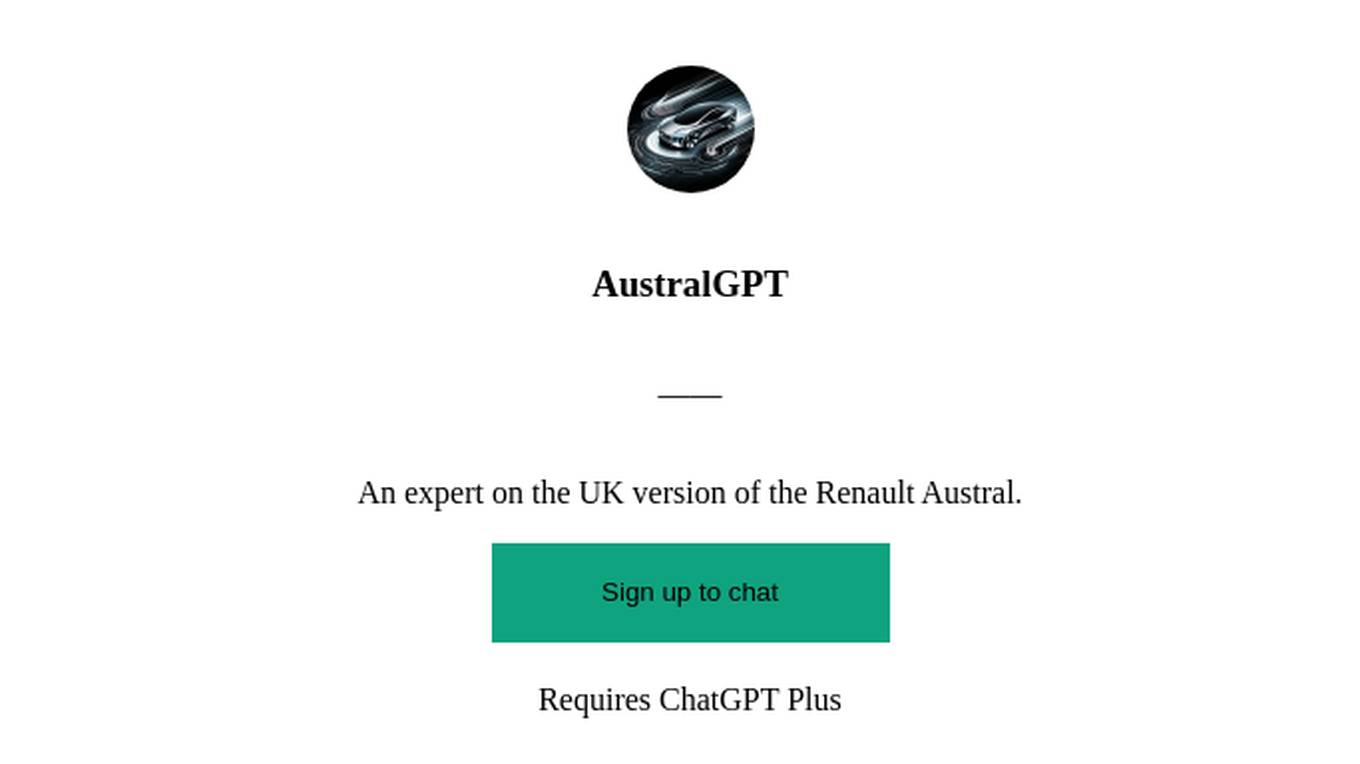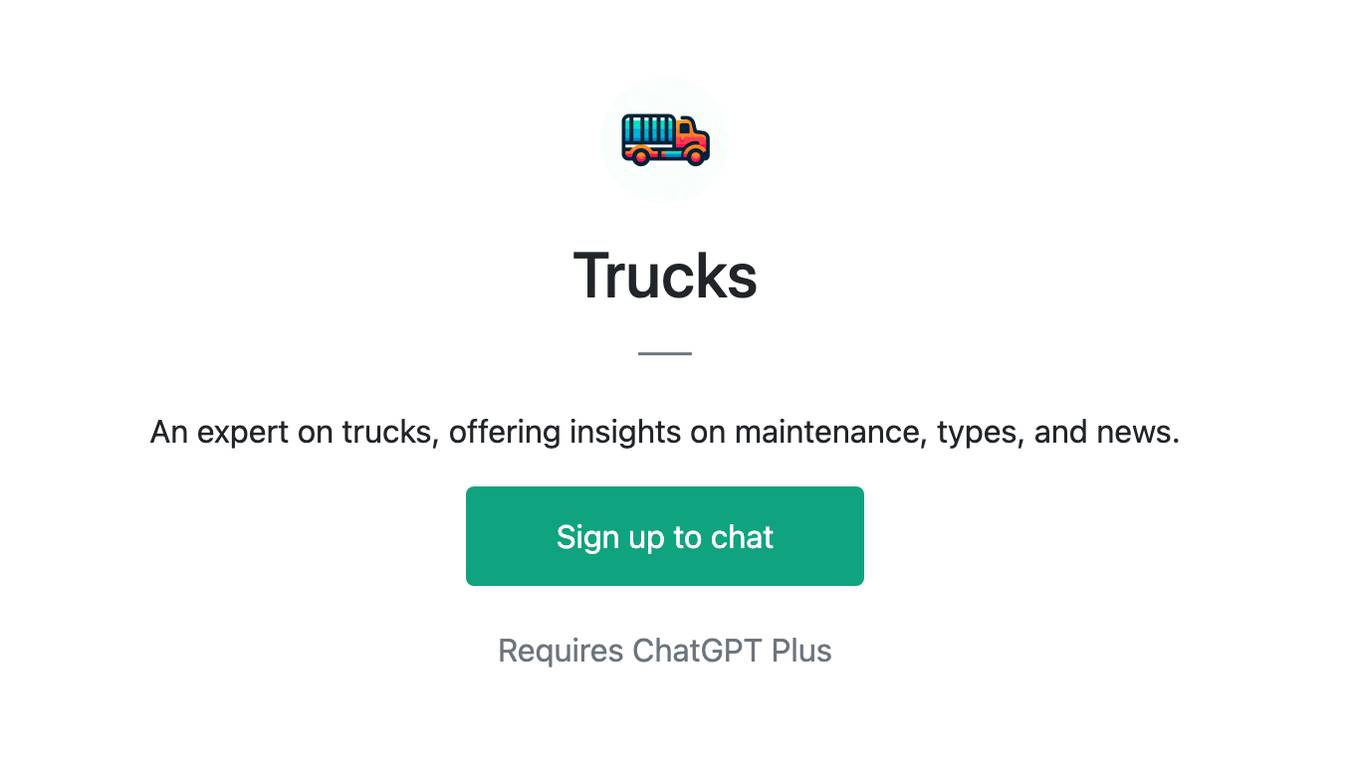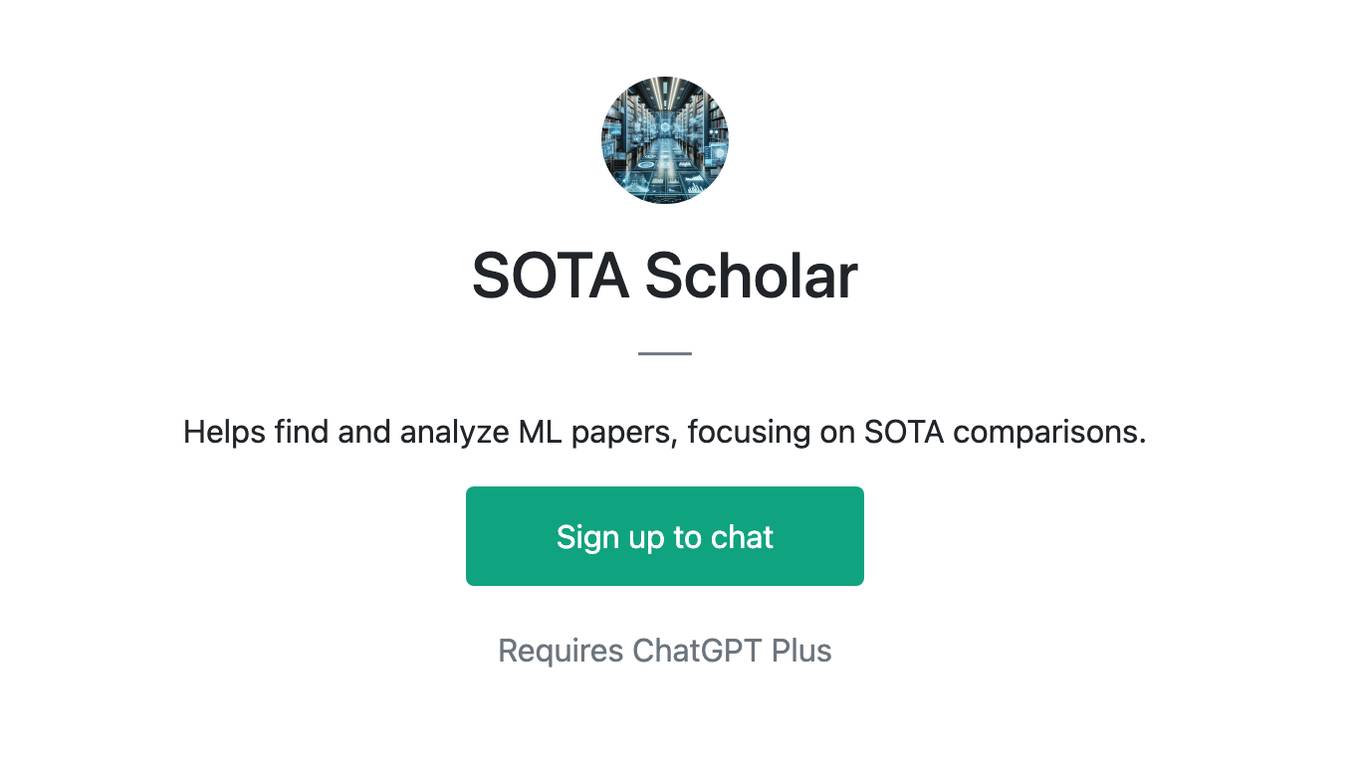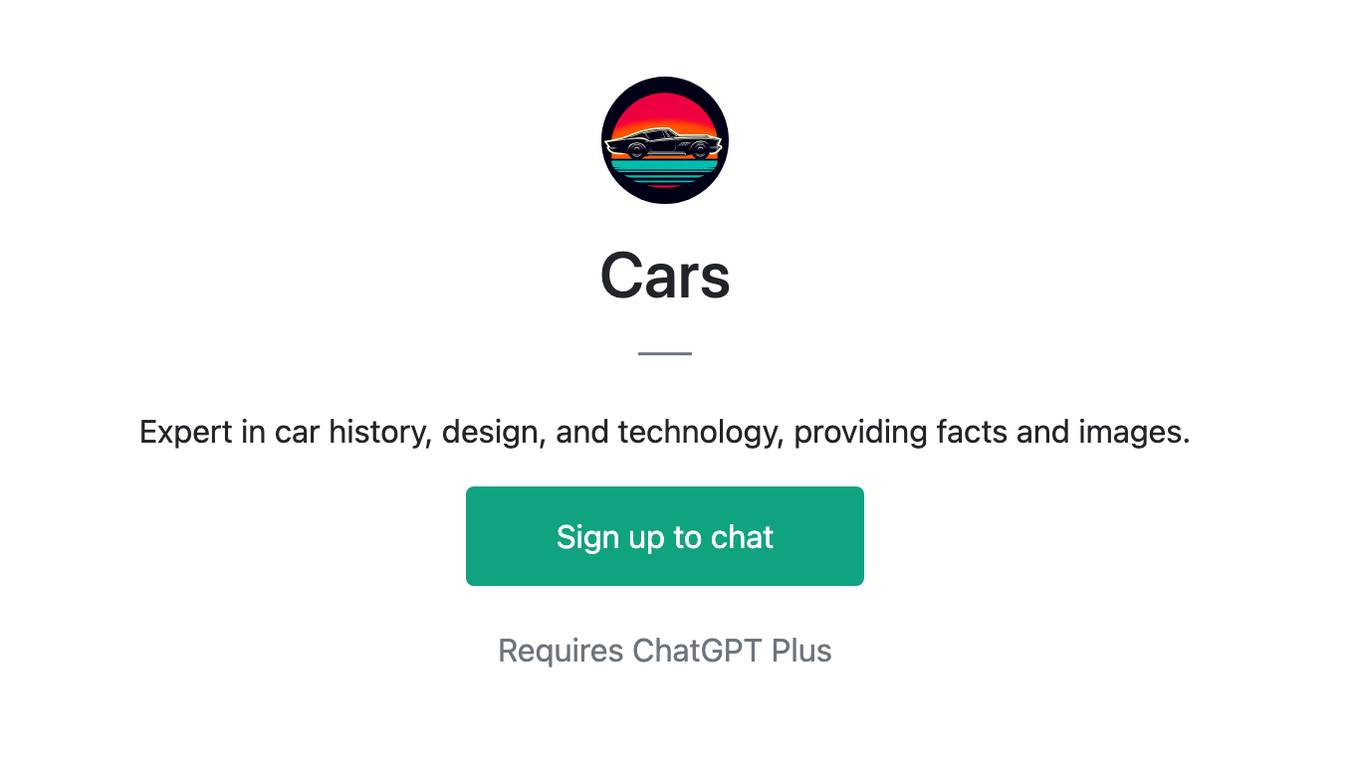Best AI tools for< Compare Model Performance >
20 - AI tool Sites
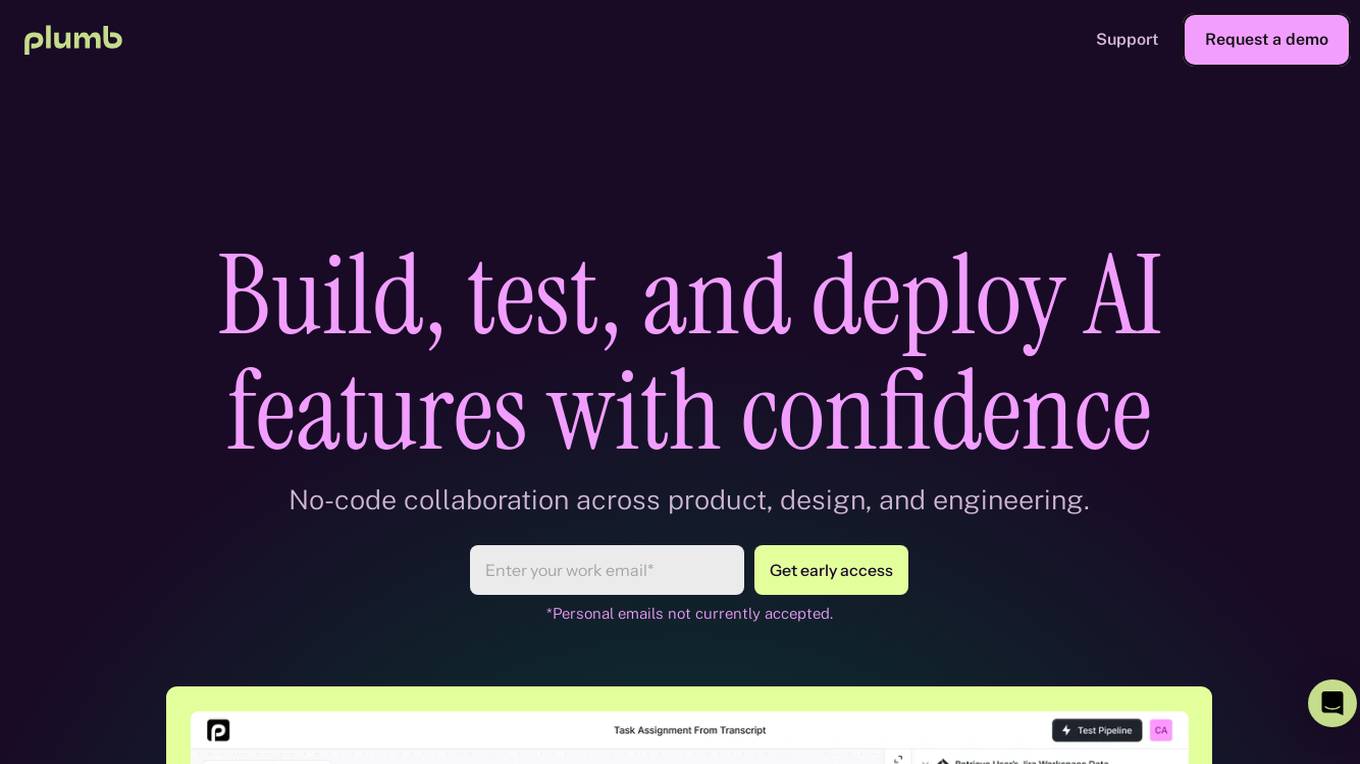
Plumb
Plumb is a no-code, node-based builder that empowers product, design, and engineering teams to create AI features together. It enables users to build, test, and deploy AI features with confidence, fostering collaboration across different disciplines. With Plumb, teams can ship prototypes directly to production, ensuring that the best prompts from the playground are the exact versions that go to production. It goes beyond automation, allowing users to build complex multi-tenant pipelines, transform data, and leverage validated JSON schema to create reliable, high-quality AI features that deliver real value to users. Plumb also makes it easy to compare prompt and model performance, enabling users to spot degradations, debug them, and ship fixes quickly. It is designed for SaaS teams, helping ambitious product teams collaborate to deliver state-of-the-art AI-powered experiences to their users at scale.
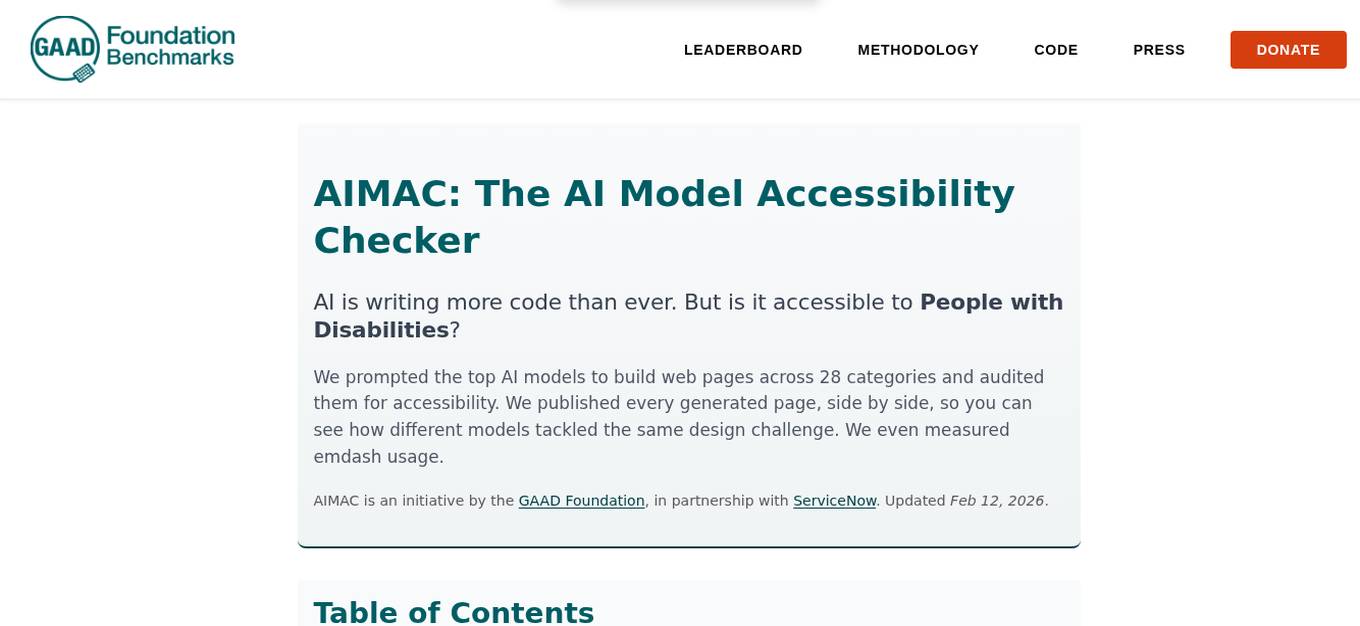
AIMAC Leaderboard
AIMAC Leaderboard is an AI Model Accessibility Checker that evaluates the accessibility of web pages generated by AI models across 28 categories. It compares top AI models side by side, auditing them for accessibility and measuring their performance. The initiative aims to ensure that AI models write accessible code by default. The project is a collaboration between the GAAD Foundation and ServiceNow, providing insights into how different models handle the same design challenges.
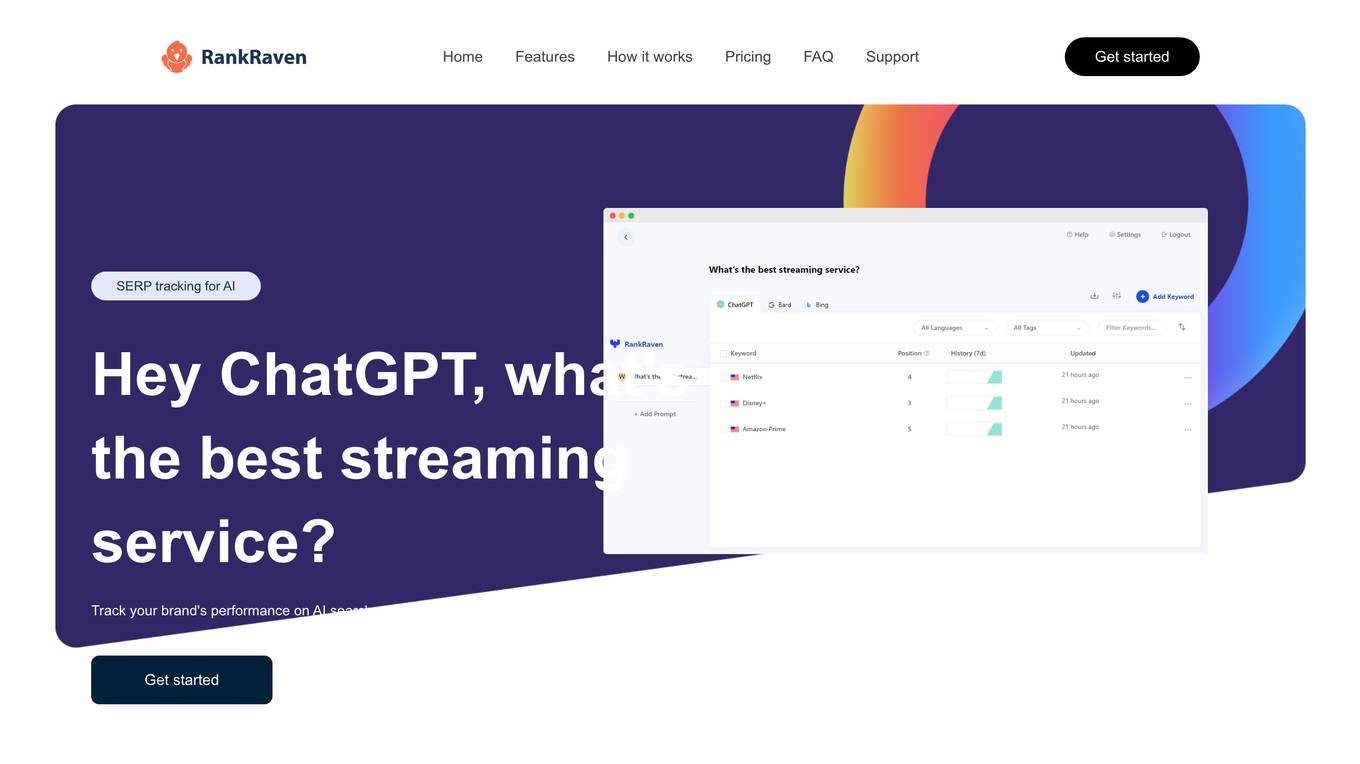
RankRaven
RankRaven is an advanced AI rank tracking tool that allows users to monitor and analyze their brand's performance on AI search engines. The tool leverages multiple AI models such as OpenAI ChatGPT, Google Bard, and Microsoft Bing to provide fast and accurate SEO tracking. Users can track their brand's rank across different AI search models, receive daily rank updates, compare performance across languages and countries, and analyze trends over time. RankRaven automates the process of running prompts and checking keyword appearances in model answers, making it a valuable tool for individuals, businesses, and agencies looking to optimize their AI SEO strategies.
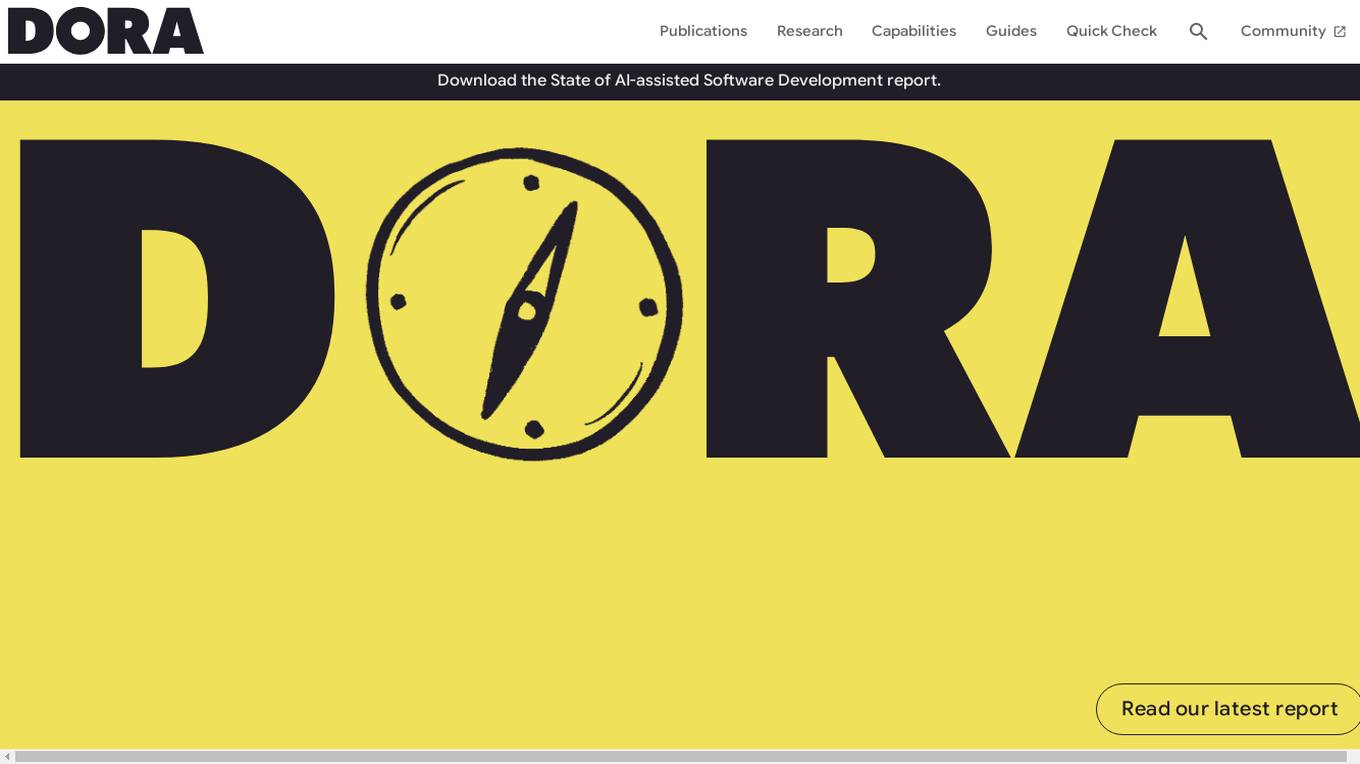
DORA
DORA is a research program by Google Cloud that focuses on understanding the capabilities driving software delivery and operations performance. It helps teams apply these capabilities to enhance organizational performance. The program introduces the DORA AI Capabilities Model, identifying key technical and cultural practices that amplify the positive impacts of AI on performance. DORA offers resources, guides, and tools like the DORA Quick Check to help organizations improve their software delivery goals.

Rawbot
Rawbot is an AI model comparison tool that simplifies the process of selecting the best AI models for projects and applications. It allows users to compare various AI models side-by-side, providing insights into their performance, strengths, weaknesses, and suitability. Rawbot helps users make informed decisions by identifying the most suitable AI models based on specific requirements, leading to optimal results in research, development, and business applications.
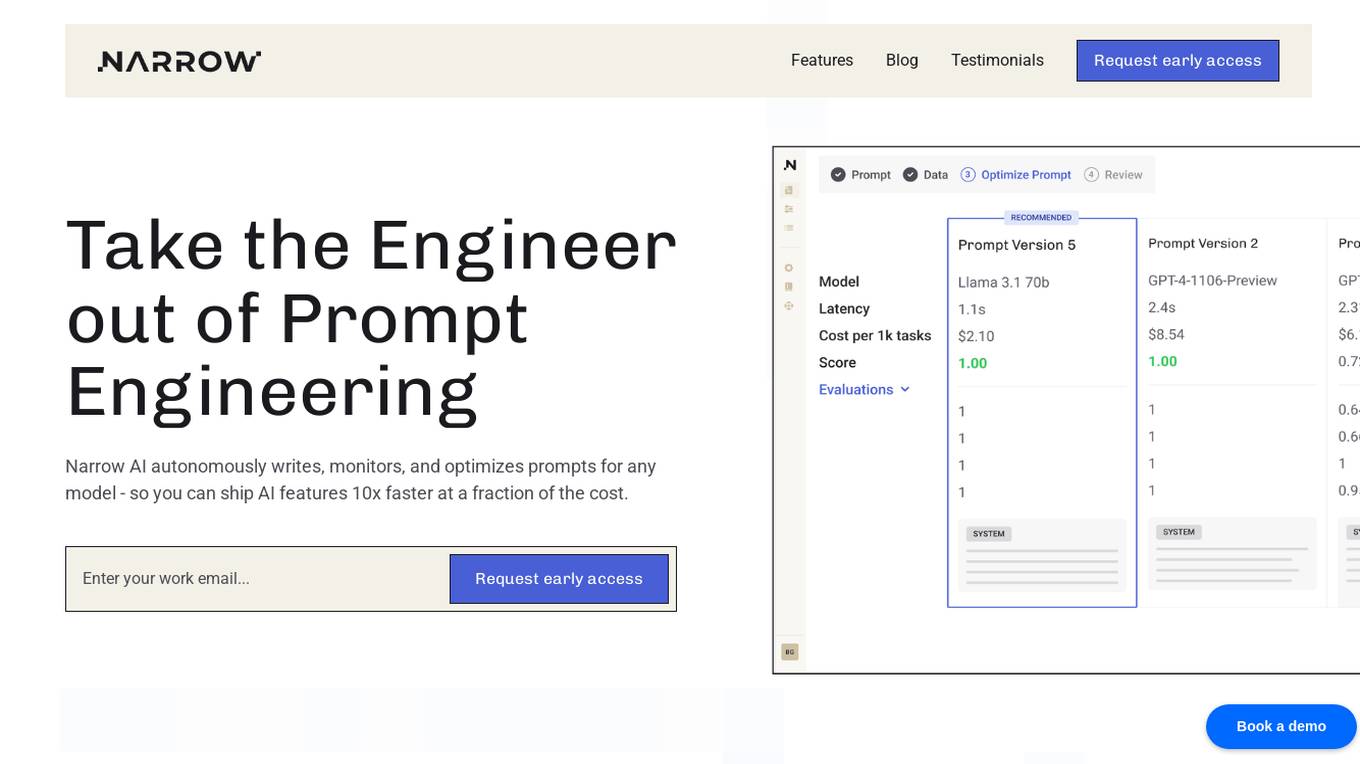
Narrow AI
Narrow AI is an AI application that autonomously writes, monitors, and optimizes prompts for any model, enabling users to ship AI features 10x faster at a fraction of the cost. It streamlines the workflow by allowing users to test new models in minutes, compare prompt performance, and deploy on the optimal model for their use case. Narrow AI helps users maximize efficiency by generating expert-level prompts, adapting prompts to new models, and optimizing prompts for quality, cost, and speed.

Focia
Focia is an AI-powered engagement optimization tool that helps users predict, analyze, and enhance their content performance across various digital platforms. It offers features such as ranking and comparing content ideas, content analysis, feedback generation, engagement predictions, workspace customization, and real-time model training. Focia's AI models, including Blaze, Neon, Phantom, and Omni, specialize in analyzing different types of content on platforms like YouTube, Instagram, TikTok, and e-commerce sites. By leveraging Focia, users can boost their engagement, conduct A/B testing, measure performance, and conceptualize content ideas effectively.
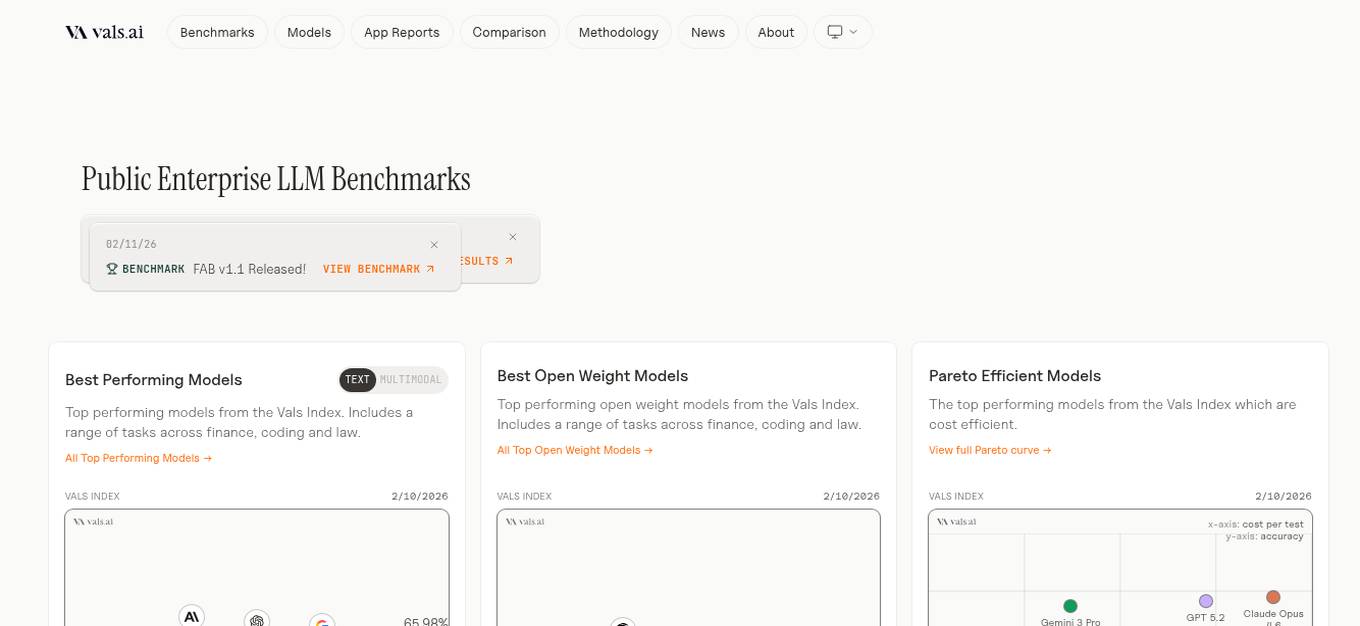
Vals AI
Vals AI is an advanced AI tool that provides benchmark reports and comparisons for various models in the fields of finance, coding, and law. The platform offers insights into the performance of different AI models across different tasks and industries. Vals AI aims to bridge the gap in model benchmarking and provide valuable information for users looking to evaluate and compare AI models for specific tasks.
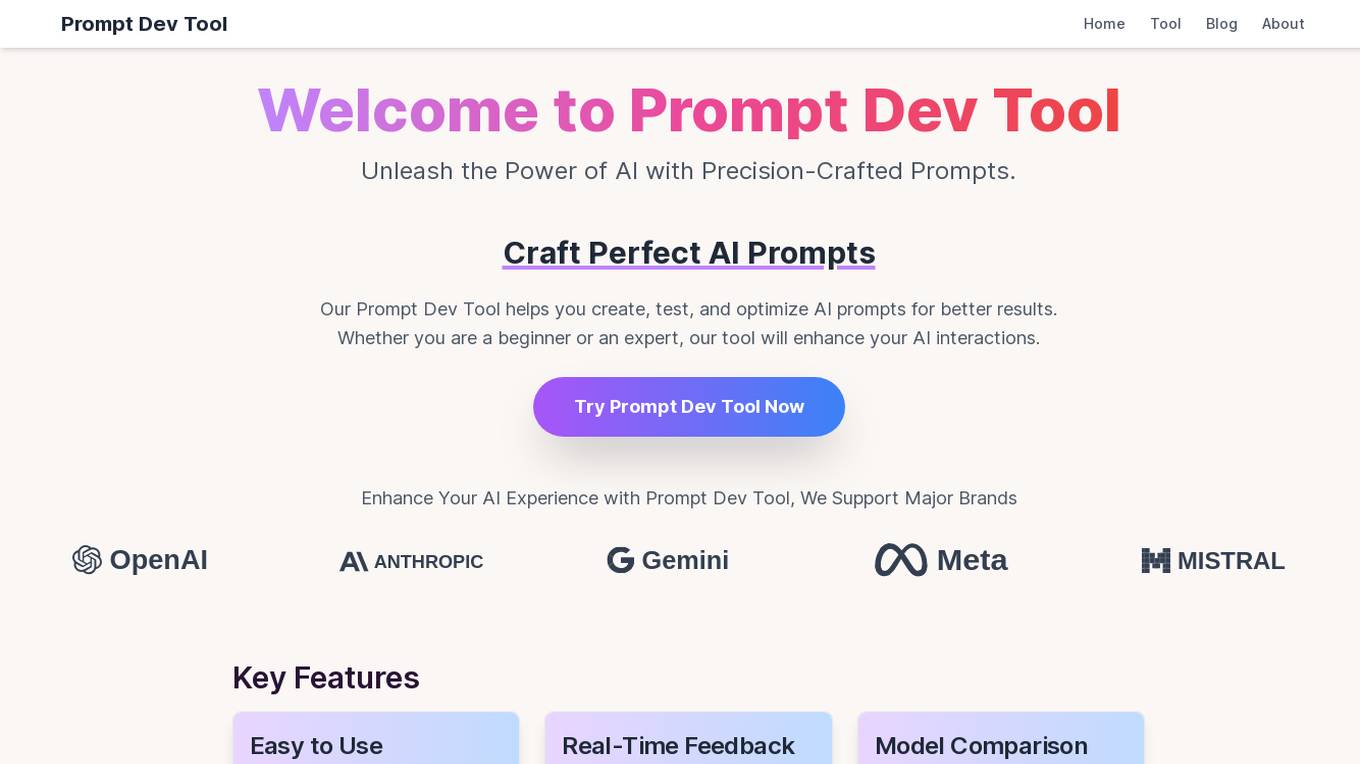
Prompt Dev Tool
Prompt Dev Tool is an AI application designed to boost prompt engineering efficiency by helping users create, test, and optimize AI prompts for better results. It offers an intuitive interface, real-time feedback, model comparison, variable testing, prompt iteration, and advanced analytics. The tool is suitable for both beginners and experts, providing detailed insights to enhance AI interactions and improve outcomes.
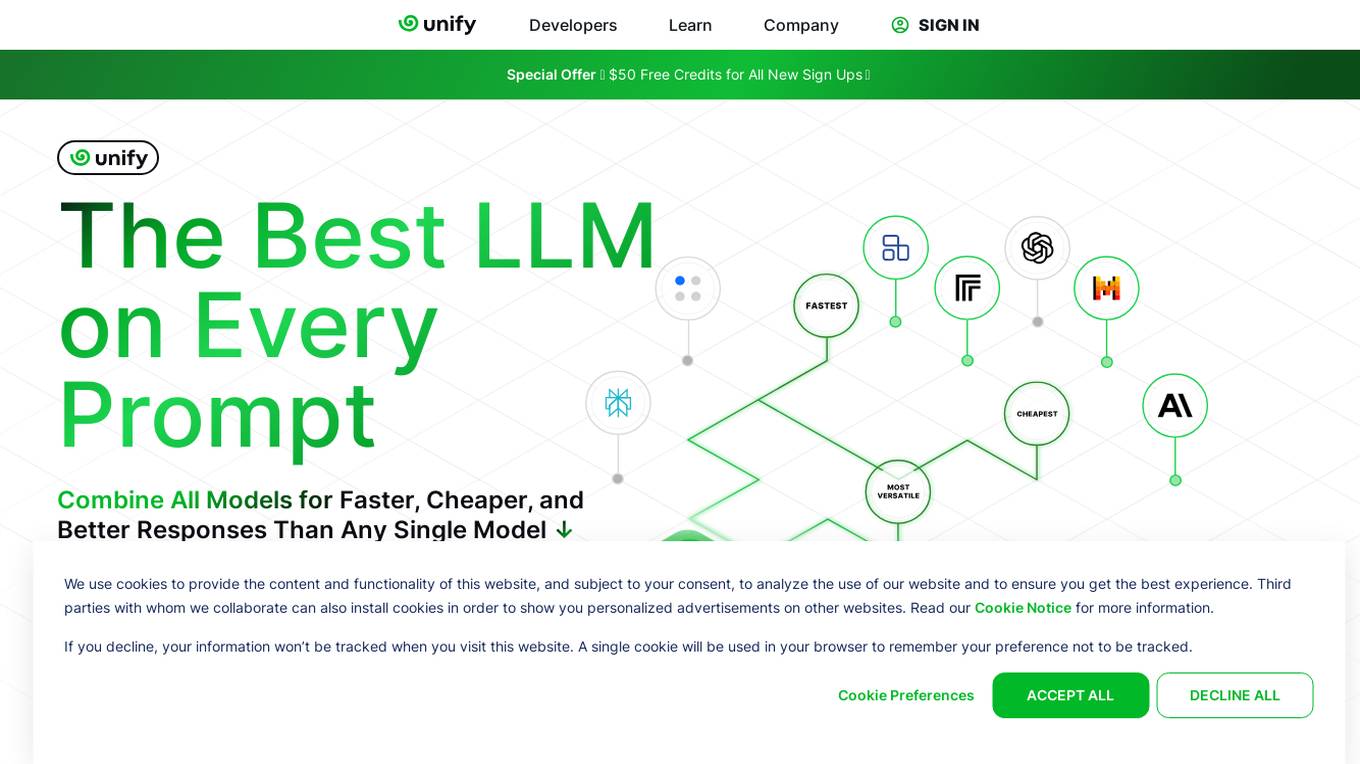
Unify
Unify is an AI tool that offers a unified platform for accessing and comparing various Language Models (LLMs) from different providers. It allows users to combine models for faster, cheaper, and better responses, optimizing for quality, speed, and cost-efficiency. Unify simplifies the complex task of selecting the best LLM by providing transparent benchmarks, personalized routing, and performance optimization tools.

LLMMM Marketing Monitor
LLMMM is an AI tool designed to monitor how AI models perceive and present brands. It offers real-time monitoring and cross-model insights to help brands understand their digital presence across various leading AI platforms. With automated analysis and lightning-fast results, LLMMM provides immediate visibility into how AI chatbots interpret brands. The tool focuses on brand intelligence, brand safety monitoring, misalignment detection, and cross-model brand intelligence. Users can create an account in minutes and access a range of features to track and analyze their brand's performance in the AI landscape.
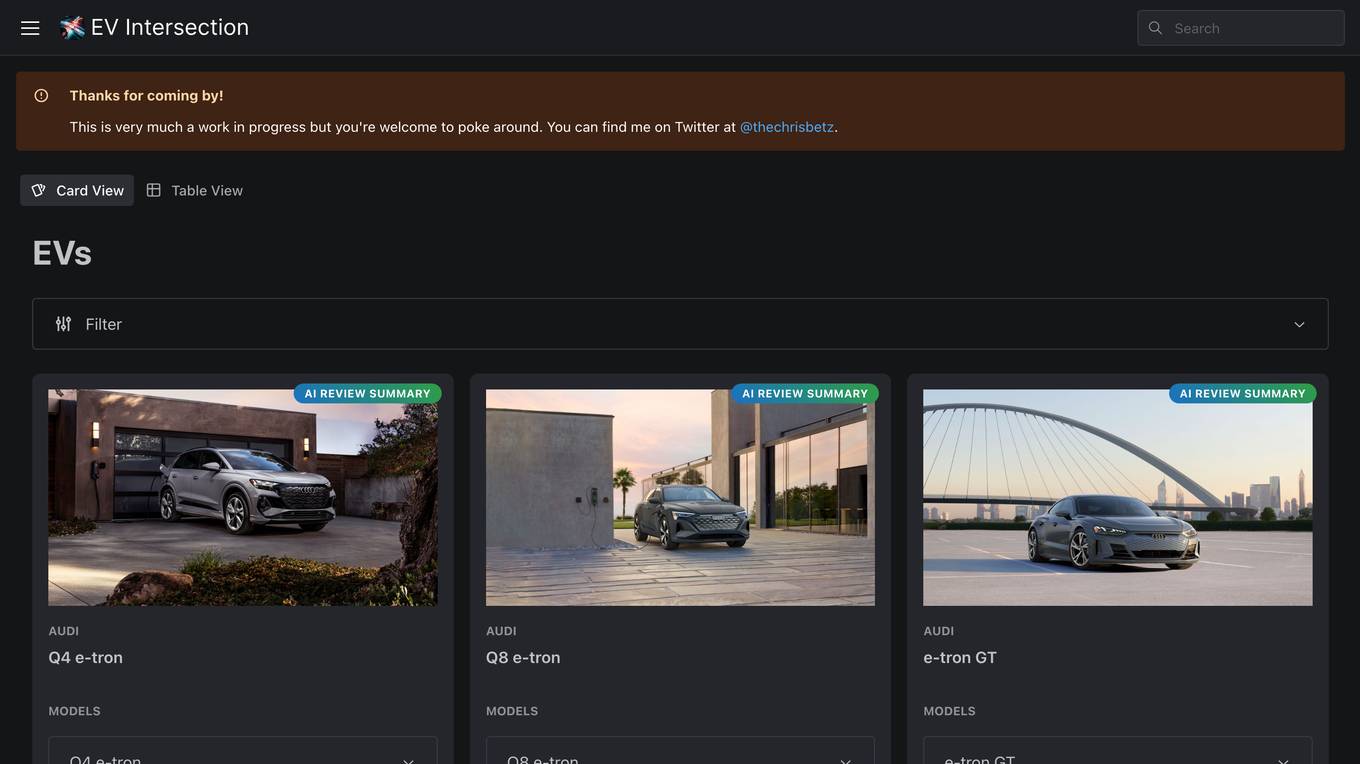
EV Intersection
EV Intersection is a website dedicated to helping users find their next electric vehicle. The site provides detailed information on various electric vehicle models, including specifications such as range, price, motor type, acceleration, and horsepower. Users can easily compare different EV models and filter them based on their preferences. Whether you're looking for a compact city car or a high-performance luxury SUV, EV Intersection has you covered with comprehensive reviews and summaries.
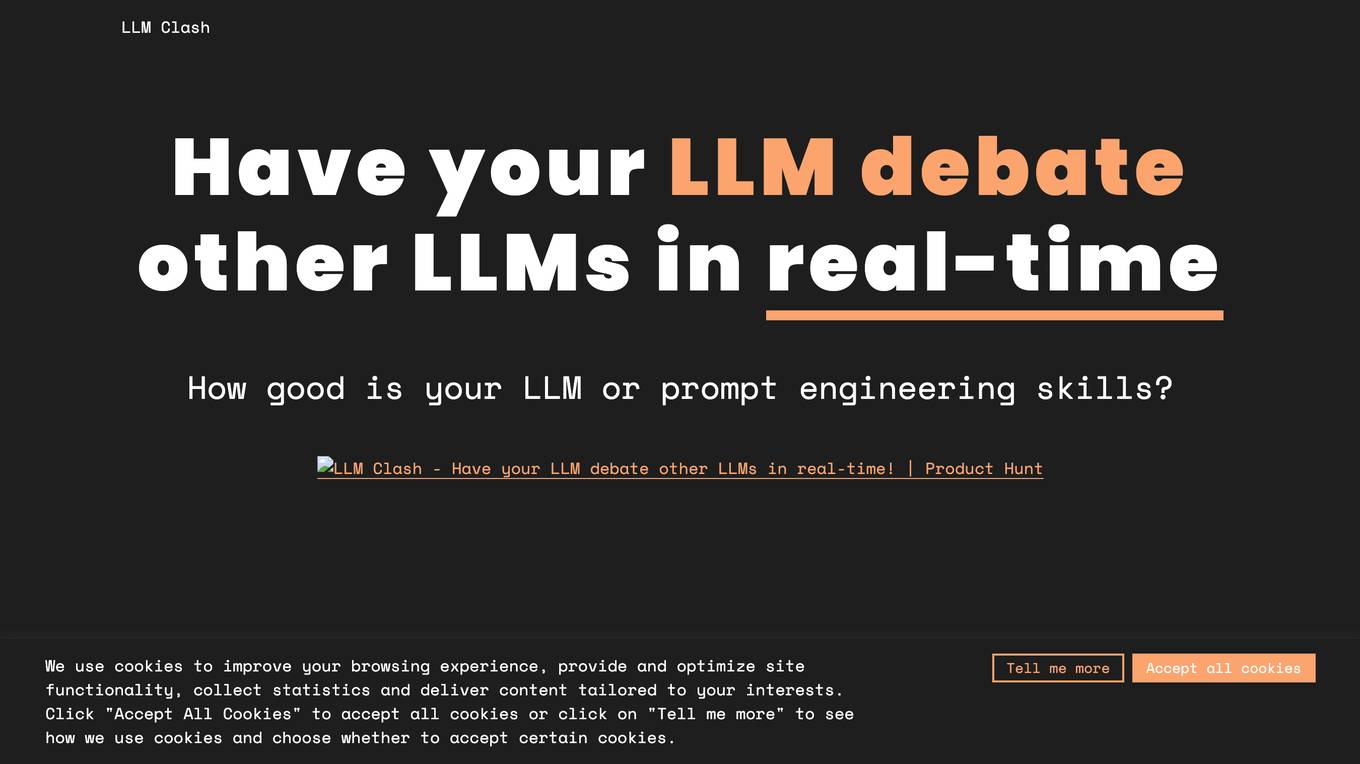
LLM Clash
LLM Clash is a web-based application that allows users to compare the outputs of different large language models (LLMs) on a given task. Users can input a prompt and select which LLMs they want to compare. The application will then display the outputs of the LLMs side-by-side, allowing users to compare their strengths and weaknesses.
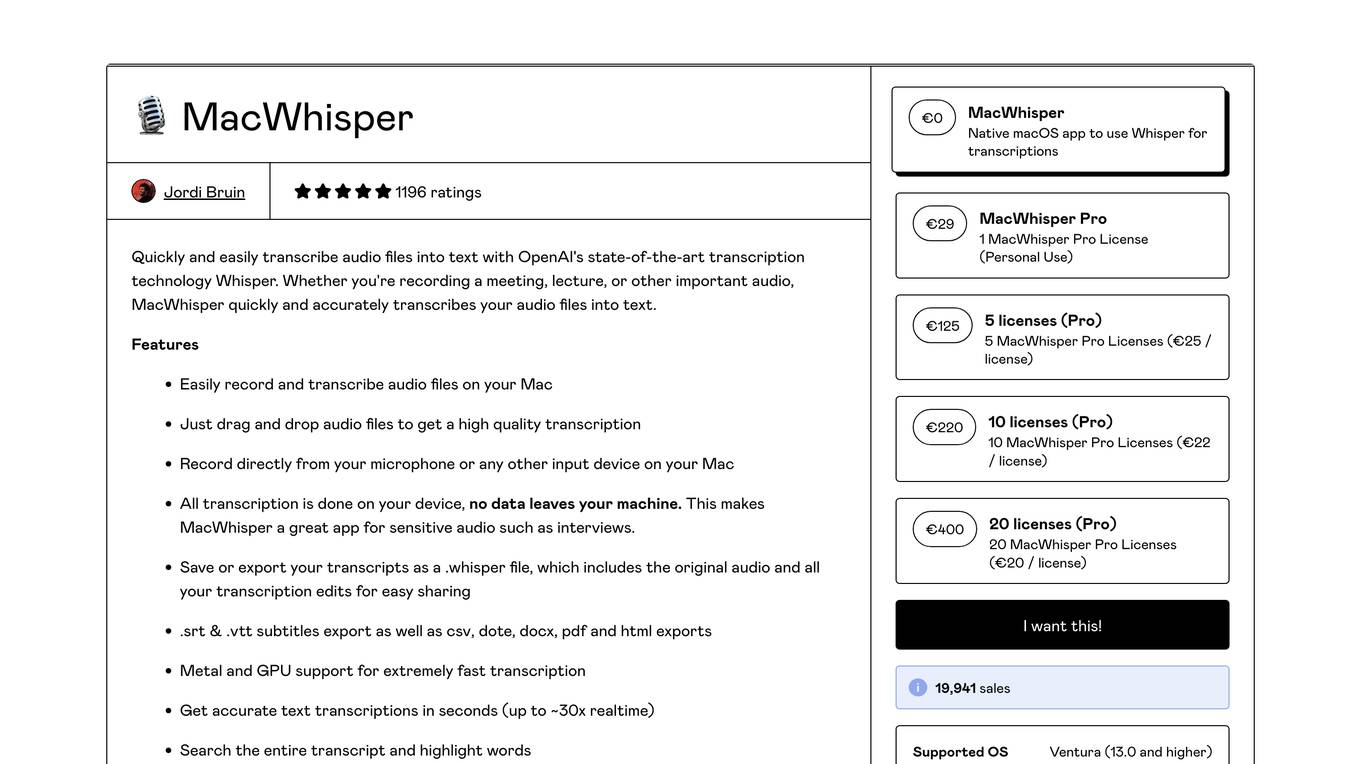
MacWhisper
MacWhisper is a native macOS application that utilizes OpenAI's Whisper technology for transcribing audio files into text. It offers a user-friendly interface for recording, transcribing, and editing audio, making it suitable for various use cases such as transcribing meetings, lectures, interviews, and podcasts. The application is designed to protect user privacy by performing all transcriptions locally on the device, ensuring that no data leaves the user's machine.
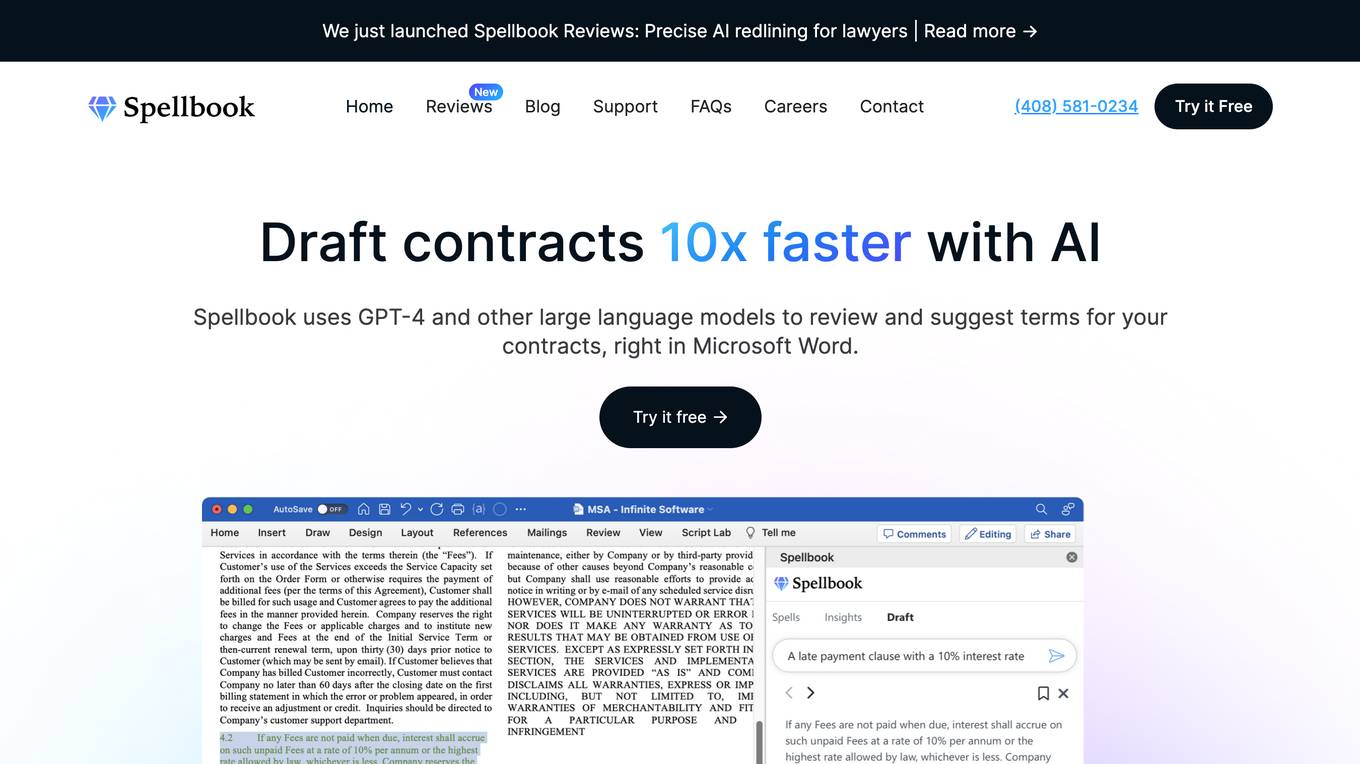
Spellbook
Spellbook is a comprehensive AI tool designed for commercial lawyers to review, draft, and manage legal contracts efficiently. It offers features such as redline contract review, drafting from scratch or saved libraries, quick answers to complex questions, comparing contracts to industry standards, and multi-document workflows. Spellbook is powered by OpenAI's GPT-4o and other large language models, providing accurate and reliable performance. It ensures data privacy with Zero Data Retention agreements, making it a secure and private solution for law firms and in-house legal teams worldwide.
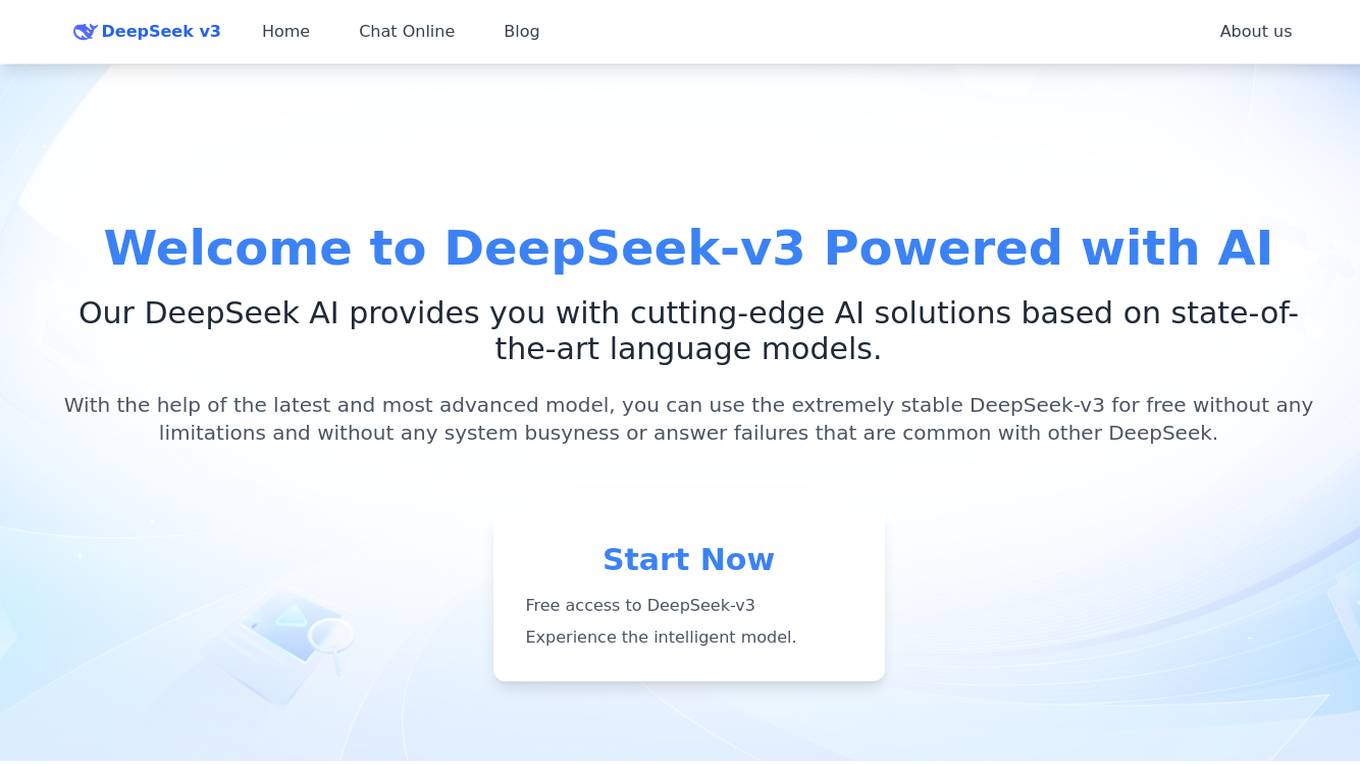
DeepSeek-v3
DeepSeek-v3 is a leading AI model and cutting-edge AI solution that provides users with state-of-the-art language models for free, without limitations or system busyness. It offers stable and efficient output, supports multiple languages and deployment options, and allows users to access cutting-edge AI solutions through a simple three-step process. DeepSeek-v3 is a major breakthrough in speed, performance, and cost-effectiveness compared to previous models, making it a competitive choice for various AI tasks.
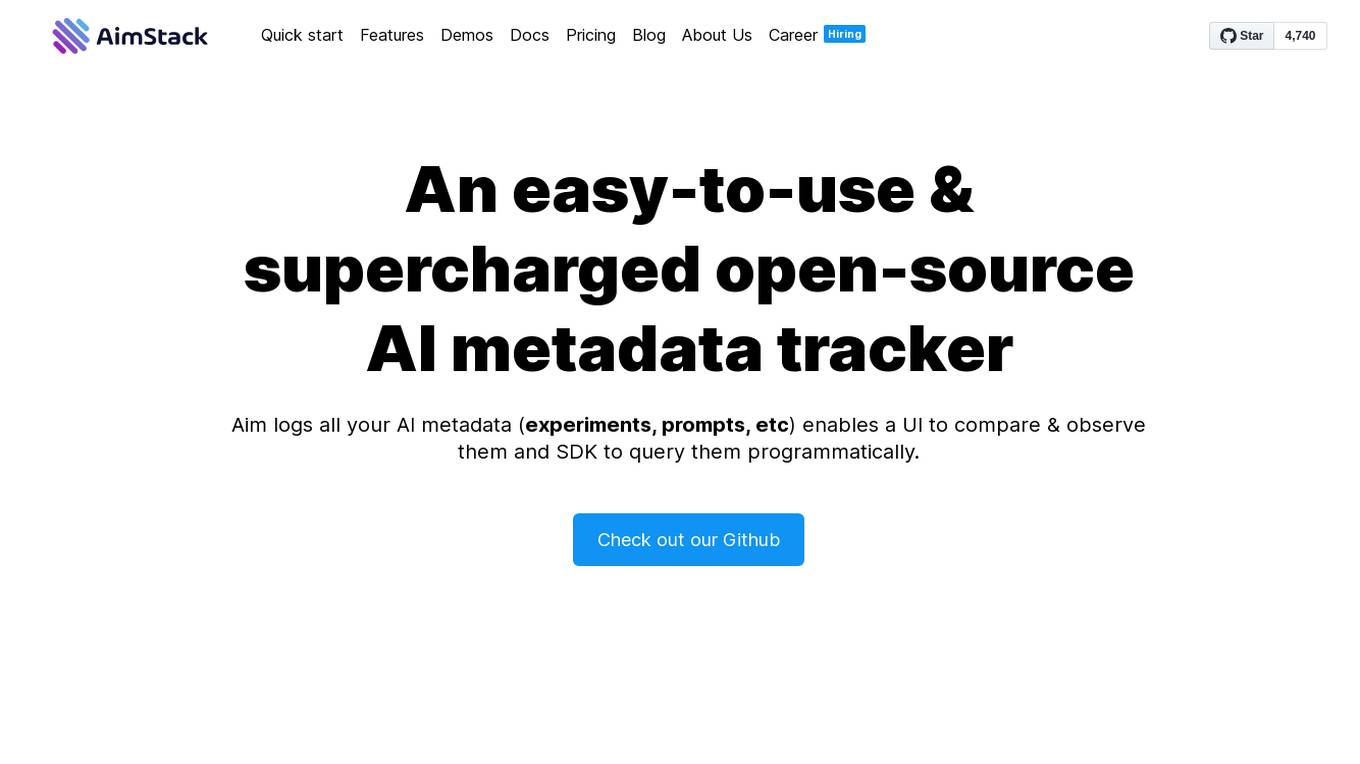
Aim
Aim is an open-source, self-hosted AI Metadata tracking tool designed to handle 100,000s of tracked metadata sequences. Two most famous AI metadata applications are: experiment tracking and prompt engineering. Aim provides a performant and beautiful UI for exploring and comparing training runs, prompt sessions.

Flux LoRA Model Library
Flux LoRA Model Library is an AI tool that provides a platform for finding and using Flux LoRA models suitable for various projects. Users can browse a catalog of popular Flux LoRA models and learn about FLUX models and LoRA (Low-Rank Adaptation) technology. The platform offers resources for fine-tuning models and ensuring responsible use of generated images.
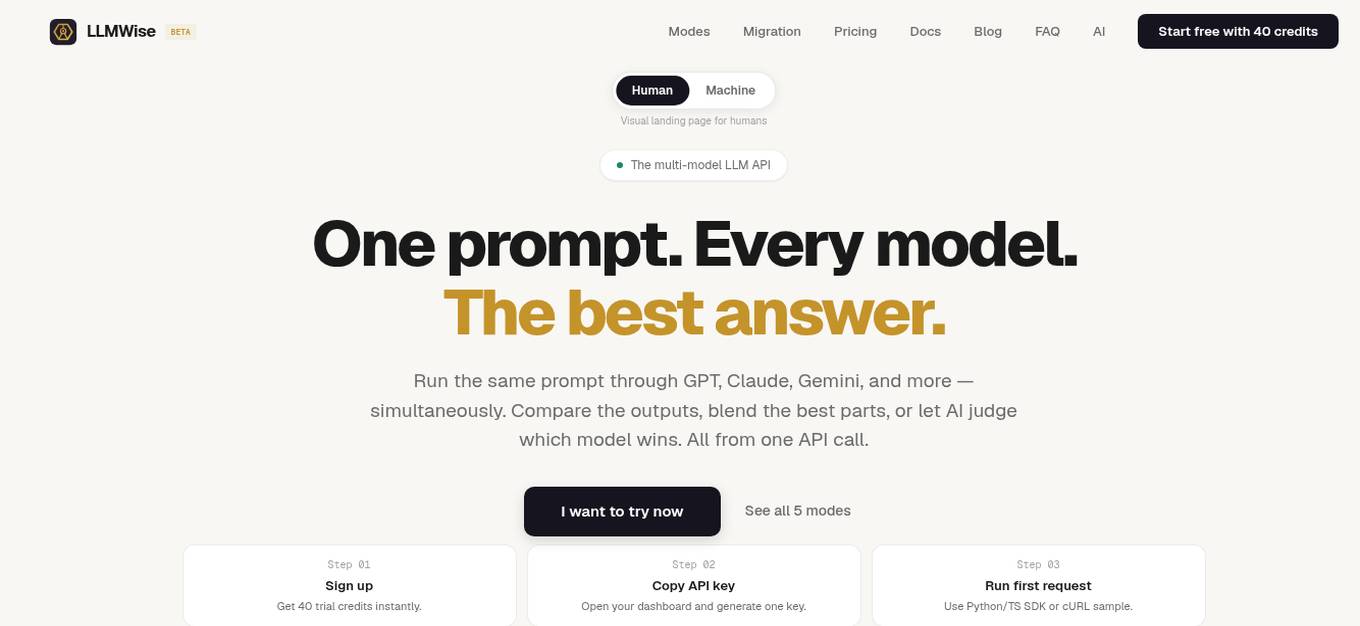
LLMWise
LLMWise is a multi-model LLM API tool that allows users to compare, blend, and route AI models simultaneously. It offers 5 modes - Chat, Compare, Blend, Judge, and Failover - to help users make informed decisions based on model outputs. With 31+ available models, LLMWise provides a user-friendly platform for orchestrating AI models, ensuring reliability, and optimizing costs. The tool is designed to streamline the integration of various AI models through one API call, offering features like real-time responses, per-model metrics, and failover routing.
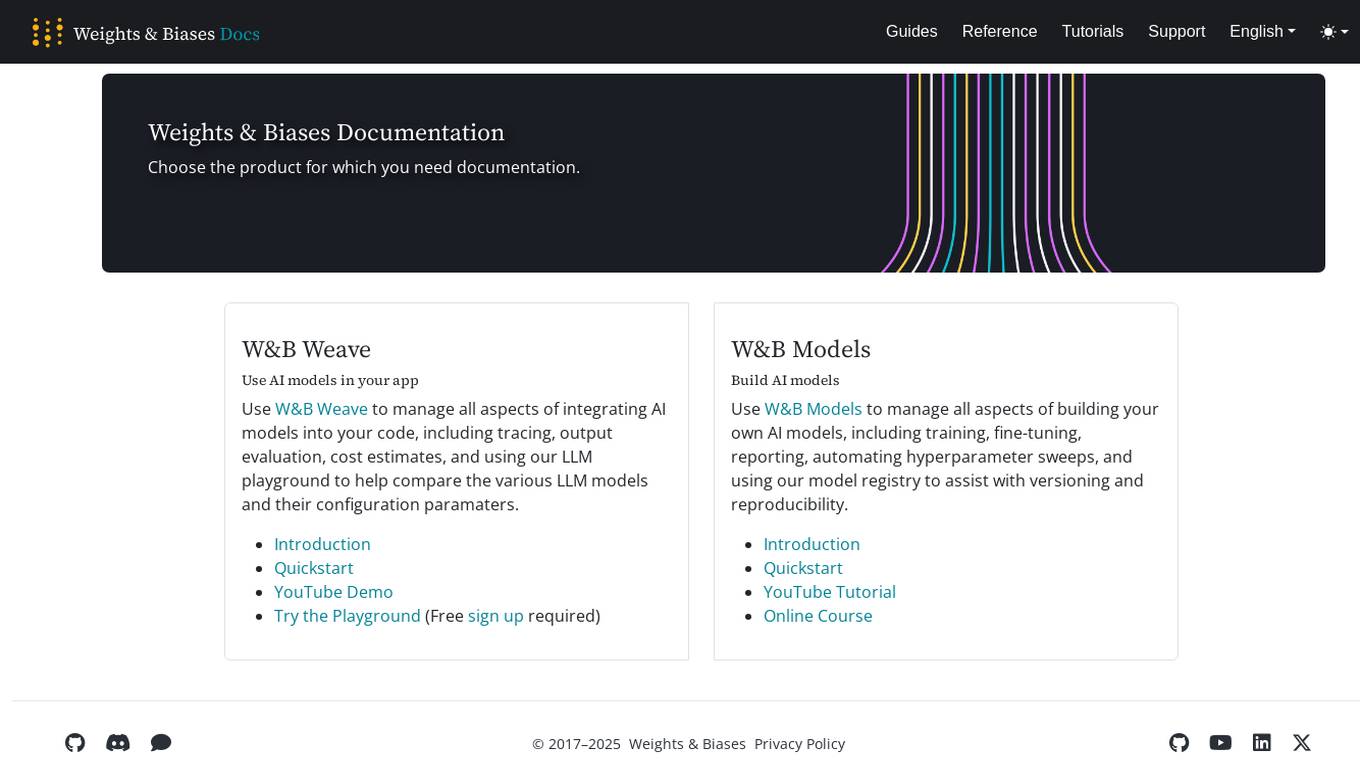
Weights & Biases
Weights & Biases is an AI tool that offers documentation, guides, tutorials, and support for using AI models in applications. The platform provides two main products: W&B Weave for integrating AI models into code and W&B Models for building custom AI models. Users can access features such as tracing, output evaluation, cost estimates, hyperparameter sweeps, model registry, and more. Weights & Biases aims to simplify the process of working with AI models and improving model reproducibility.
4 - Open Source AI Tools
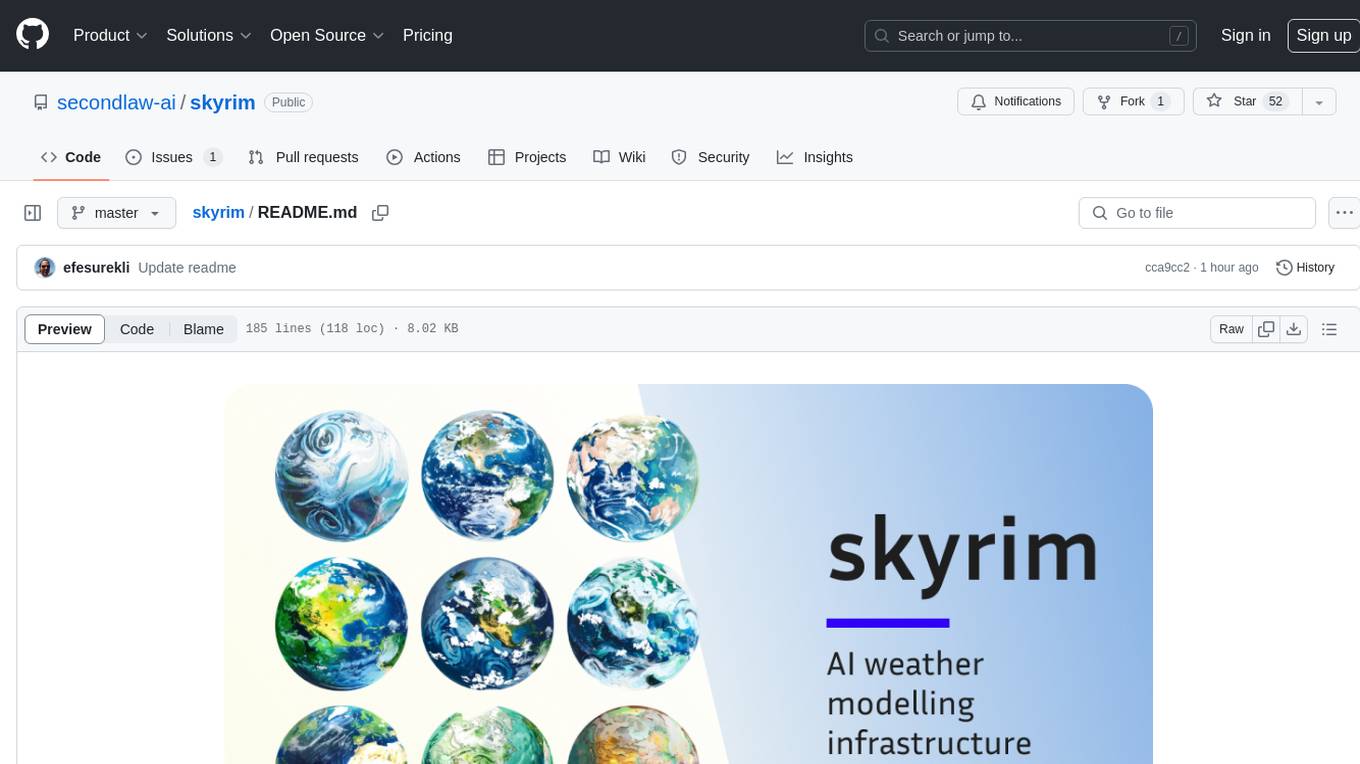
skyrim
Skyrim is a weather forecasting tool that enables users to run large weather models using consumer-grade GPUs. It provides access to state-of-the-art foundational weather models through a well-maintained infrastructure. Users can forecast weather conditions, such as wind speed and direction, by running simulations on their own GPUs or using modal volume or cloud services like s3 buckets. Skyrim supports various large weather models like Graphcast, Pangu, Fourcastnet, and DLWP, with plans for future enhancements like ensemble prediction and model quantization.
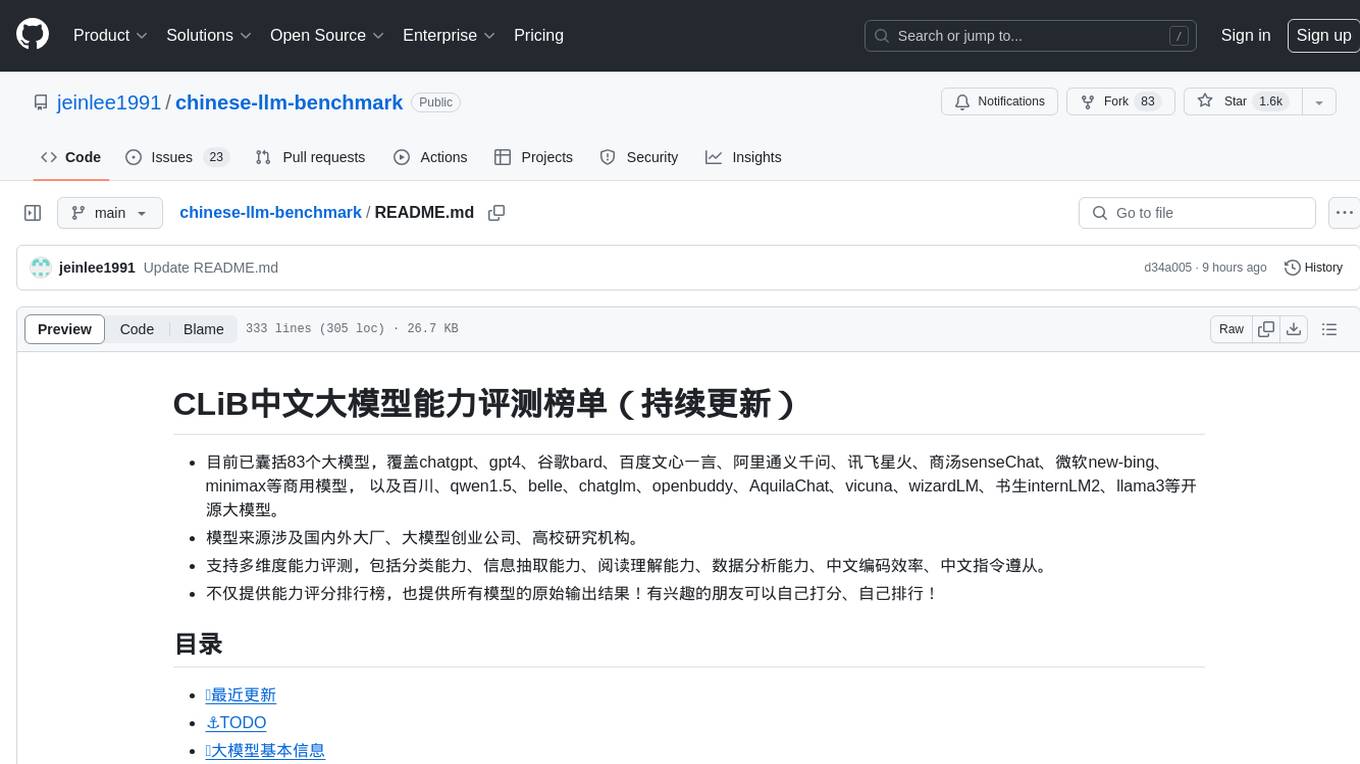
chinese-llm-benchmark
The Chinese LLM Benchmark is a continuous evaluation list of large models in CLiB, covering a wide range of commercial and open-source models from various companies and research institutions. It supports multidimensional evaluation of capabilities including classification, information extraction, reading comprehension, data analysis, Chinese encoding efficiency, and Chinese instruction compliance. The benchmark not only provides capability score rankings but also offers the original output results of all models for interested individuals to score and rank themselves.
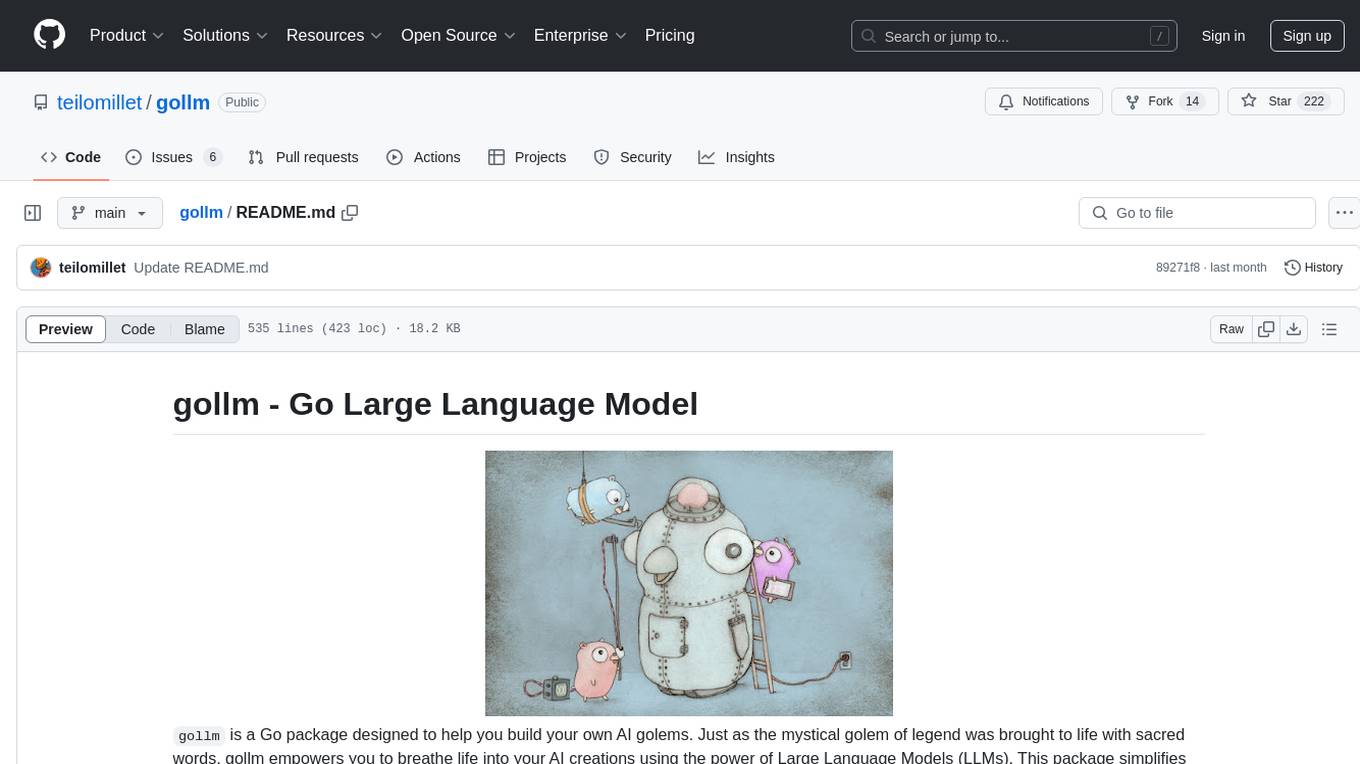
gollm
gollm is a Go package designed to simplify interactions with Large Language Models (LLMs) for AI engineers and developers. It offers a unified API for multiple LLM providers, easy provider and model switching, flexible configuration options, advanced prompt engineering, prompt optimization, memory retention, structured output and validation, provider comparison tools, high-level AI functions, robust error handling and retries, and extensible architecture. The package enables users to create AI-powered golems for tasks like content creation workflows, complex reasoning tasks, structured data generation, model performance analysis, prompt optimization, and creating a mixture of agents.
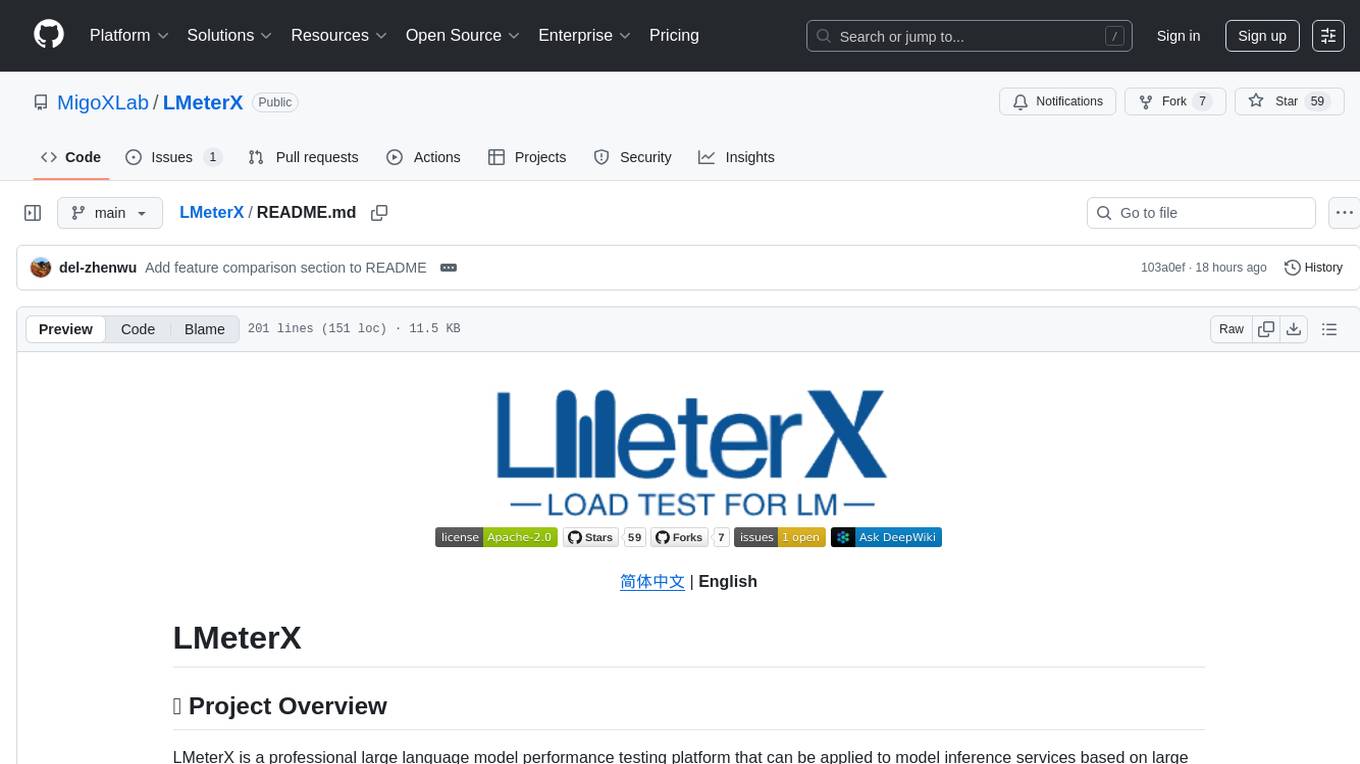
LMeterX
LMeterX is a professional large language model performance testing platform that supports model inference services based on large model inference frameworks and cloud services. It provides an intuitive Web interface for creating and managing test tasks, monitoring testing processes, and obtaining detailed performance analysis reports to support model deployment and optimization.
20 - OpenAI Gpts
Best price kuwait
A customized GPT model for price comparison would search and compare product prices on websites in Kuwait, tailored to local markets and languages.

Auto Advisor
A helpful guide for car buyers, focusing on potential issues with different car models.
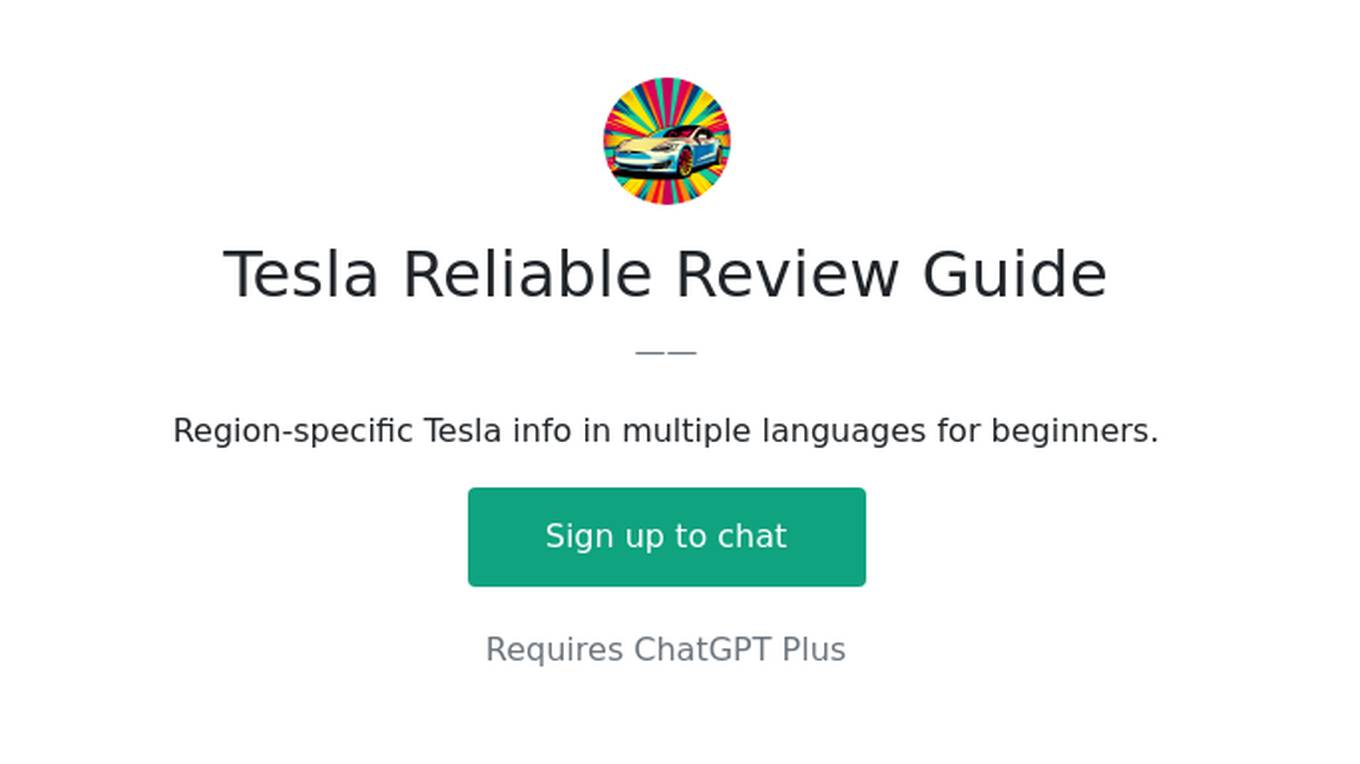
Tesla Reliable Review Guide
Region-specific Tesla info in multiple languages for beginners.
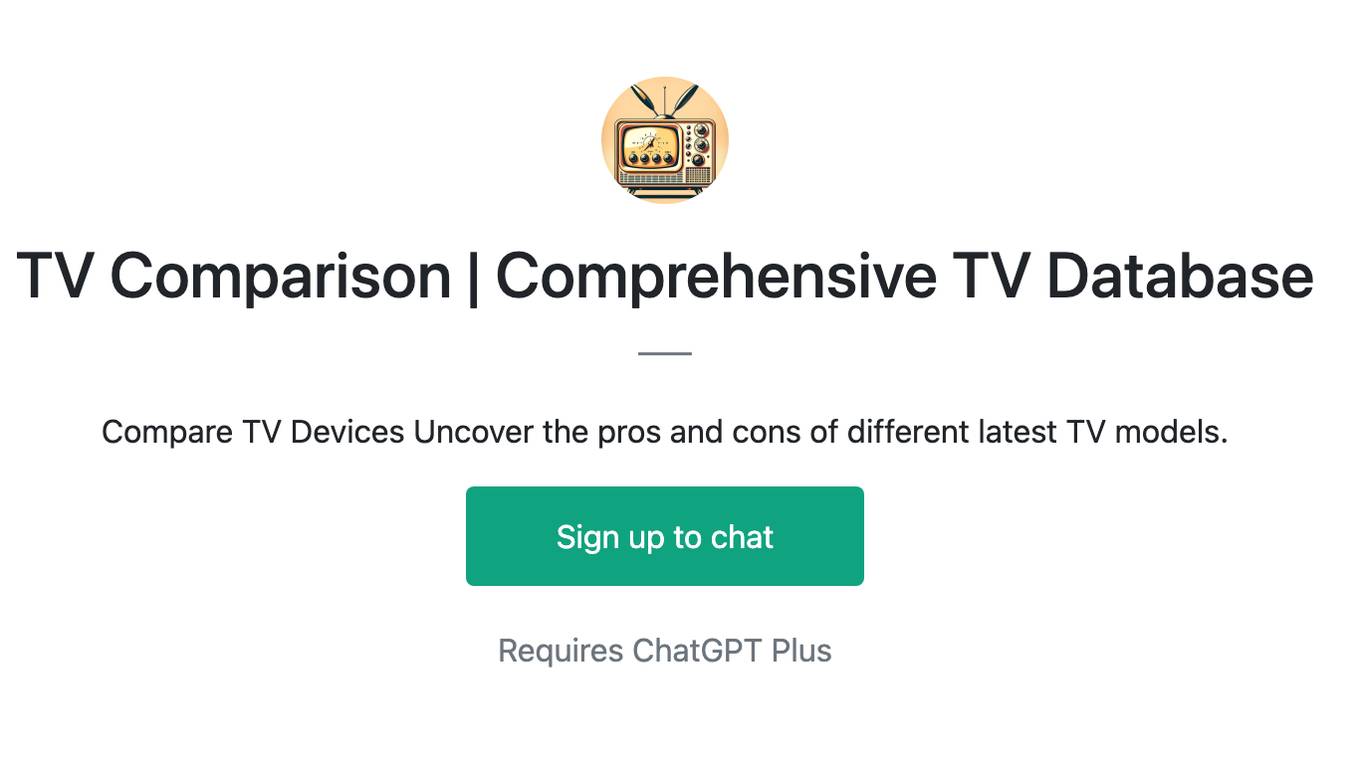
TV Comparison | Comprehensive TV Database
Compare TV Devices Uncover the pros and cons of different latest TV models.
